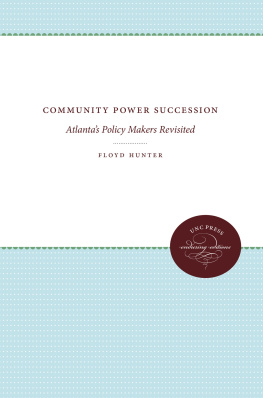1980 The University of North Carolina Press
All rights reserved
Manufactured in the United States of America
Library of Congress Catalog Card Number 79-305
Cloth edition, ISBN 0-8078-1314-1
Paper edition, ISBN 0-8078-4067-X
Library of Congress Cataloging in Publication Data
Hunter, Floyd.
Community power succession.
Bibliography: p.
Includes index.
1. AtlantaSocial policy. 2. Power (Social sciences) 3. Community leadership. 4. Decision-making. I. Title.
HN80.A8H86 301.155 79-305
ISBN 0-8078-1314-1
ISBN 0-8078-4067-X pbk.
THIS BOOK WAS DIGITALLY MANUFACTURED.
Introduction
One must immediately differentiate this work from its earlier companion work, Community Power Structure, or Study I, as I shall call it. It was initially concerned with quite different questions from those which will concern us here in Community Power Succession. I shall use the term Study II to identify the second work.
Because Study I opened a new area, the empirical study of social power, questions of methods and scope had to be addressed. One substantive question of scope was: Does Atlanta have, in terms of identifiable social roles, an informal as well as a formal power structure? And importantly, in terms of the ultimate findings of the study, What implications does such a structure have for the traditional concepts of American democracy?
In continuous publication since it was written, Study I is now a quarter of a century old. Nevertheless, as I began Study II I assumed that my earlier findings were still valid, an assumption I confirmed almost immediately upon my return visits to the community. Indeed, an active, easily identifiable power structure was still in place. My questions then became: How does it differ from that of 1950? What were the processes of succession? What has it been up to? And, finally, Is democracy better served by this structure than its predecessor?
As will be shown in the materials to follow, I found a number of structural changes in Atlantas power structure over time but little change in terms of its major functions or in its democratic implications.
A few correspondents acquainted with the host of studies that have accumulated since the publication of Study I have occasionally asked why I have never responded to various criticisms, positive and negative. To them I must say that I decided early after criticisms began that I would not answer individual critics. I have always felt that academic arguments are relatively fruitless, convincing to very few. I felt that the best general answers might lie in correcting in the succeeding works, with which I had been immediately occupied, any mistakes I recognized. Publicly, I have spoken with both positive and negative critics. And at last, I found that most of both kinds of critics had been answered by others; none of their answers, apparently, are pleasing to their opposites!
I feel that very much more time has been spent in the past two decades on methodological discussion than has been necessary and too little time on the more important issue of how democratic it is to have policy made by such limited groups as have been involved in policy-making in America for so long as one might remember. Thus, this work, in contrast to Study I, will be very much concerned with this political question and, what is more important, from a social science point of view.
At any rate, in the bibliography of this work, I do include the works of a number of people who I believe have made significant contributions to the study of community power in the past two decades. Otherwise, here I shall refer only to methods of community power study as they may explain the present work and which seem to me to have remained valid. I shall reserve the right to reply to any chronic criticisms at a later time and in more appropriate ways than by doing so in the introduction of a new work.
In the final chapter I will present in model form with accompanying discussion suggestions for what might be done to bring more balance into a situation now characterized by extreme political imbalance. A set of social and political hypotheses constitutes the essential base of reasoning behind the political discussion running through the whole work. These hypotheses, which are first stated in this Introduction, below, also will be referred to throughout the work.
This book views Atlanta in transition during two decades, 1950 through the 1960s, and into the major part of the third decade, the 1970s. The next to the last chapter of the work is intended to be politically critical, that is, critical of the drift and thrust of policy-making in a major urban center of America. The last chapter, critically positive, will present a balanced model of what might be done as a beginning toward solution of the many problems of the city created by the reigning imbalances. The suggestions are not utopian. They are set forth as illustrations of successful economic and political organizations that use alternative ways of raising and expending capital, which are at work today in both the United States and in other economically advanced parts of the world.
One of my recurrent assertions is that human behavior may be classified institutionally and observed within such a frame of reference. Political behavior, then, is one such classification. I have found that one can observe political behavior (policy-making behavior) best by observing men in action in collective association with one another, whether the association be public or private, formal or informal, in character. Associations are the visible manifestations of institutional value or belief systems. A number of my social and political hypotheses concerning power are framed in this context.
I will point out repeatedly that in the United States the system of institutional policy-making is gravely imbalanced, skewed in favor of economic institutional values. Any thinking person is in some degree aware of this skew. It is visible at all levels of societal life, community, national, and international.
I take issue with those who would obscure the fact that specific men holding specific positions in society make the major decisions that direct our lives. A majority of such decisions are directed from the control centers of the private enterprise sector of America, and to some extent by British and European systems (the Western bloc). This bloc keeps a wary eye on the Eastern one, and both follow the growing dictates of the rapidly formed but as yet undefined institutional set, the technological sector, in both of these societies. Many are weary indeed with the international paranoia and costly continuation of conflict between national states.
I also take vigorous issue with those who have claimed in this century that massive, unidentifiable irrational forces rule our lives rather than identifiable minorities of irrational men. Social irrationality in both instances arises from convictions based on false premises. The major false premise in world thinking is that either political or economic values alone are sufficient to guide the actions of men without reference to other vital institutional values concerning religion, the family, recreation, health, welfare, and education. There is a drumfire of negation or denigration of the values in these latter institutional clusters, values necessary to mans very survival. Many people know this intuitively, if not consciously, and many in recent times in the United States have acted upon it. The consistent, conscious aid given to the farm workers unionization efforts in California by religious groups is a vivid case in point. Martin Luther King, Jr.s religious base of operations is another. The conservation groups who have raised questions about the destruction of the environment is yet another.



